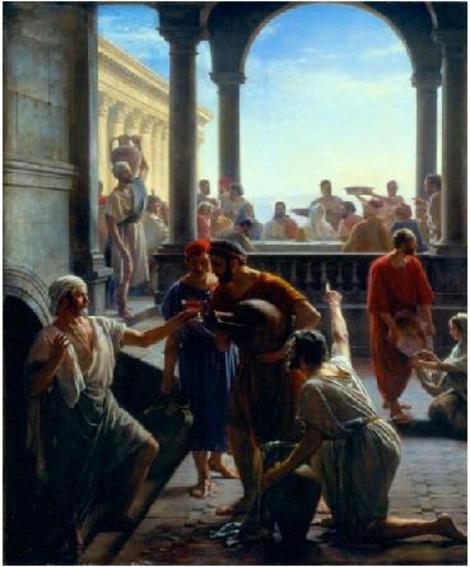
PUTTING
JEREMIAH INTO THE PIT.
THE history of Jeremiah is a very sad one, and he wrote the most mournfully of all the prophets. This was owing to the troublous times in which he lived, for he prophesied when the children of Israel had already gone into captivity, and when that of Judah, having reached the height of its wickedness, was, therefore, fast approaching its end. He foretold the calamities that should overwhelm the kingdom when the Babylonians should come against it, and destroy Jerusalem and the temple, and take the people captives to Babylon, where they should remain seventy years.
This so enraged the princes, false prophets, and the unfaithful priests, that they begged Zedekiah to let them put the prophet to death; and the weak-minded king, not daring to act contrary to their wishes, left him in their hands. And a most terrible death was that which they intended for him. In many of the prisons of the Jews there was a place sometimes called the inner prison, and sometimes spoken of as the dungeon. But it was not what we should understand by a dungeon merely a small, dark, underground room but a deep hole in the floor of the prison, called by the prophet Zechariah a pit, and filled, not with water, but filthy mud, in which were, no doubt, creeping things.
Into this horrible hole were put those prisoners whom the authorities wished to have most rigorously treated, and they were left, up to the chin in the mire, to die the slow death of starvation.
As the princes and false prophets were very angry indeed at Jeremiah, they designed for him this fearful death; and having fastened cords to his body, they let him down into the dungeon, and left him without food.
But God, who did not forget his faithful servant, found a means of delivering him. In the palace of Zedekiah there lived a man called Ebedmelech, an Ethiopian, who feared God.
So shocked was he on hearing of the horrible and unjust punishment inflicted on Jeremiah, that he went to the king, and told him what had happened in so mournful a strain that Zedekiah was moved to pity, and he commanded Ebedmelech to get Jeremiah out of the pit. But it was much easier to put a man into that loathsome dungeon than to get him out again; and the bitter enemies of the prophet might offer some resistance. Zedekiah, therefore, told his servant to take thirty men with him; and cords were lowered into the pit, with loops at the ends for Jeremiah to pass his arms through. And in this way he was drawn up. Though Jeremiah deeply lamented the fall of the city and the captivity of his people, he himself met with better treatment from the conquerors than he had received from his countrymen. "Take him, and look well to him, and do him no harm; but do unto him even as he shall say unto thee," was the order given by Nebuchadnezzar to the captain of the guard. So when all the weeping captives were assembled at Ramah, waiting to be carried away from their beloved land, the captain of the guard told Jeremiah that he could remain in his own country if he wished; and he gave him food and money. So the prophet went to live at Mizpah.
Sel.